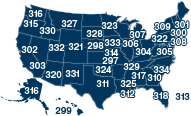A referendum of the entire NPMHU membership is now pending for ratification of the tentative agreement to establish the terms of the 2016 National Agreement between the NPMHU and the U.S. Postal Service. Ratification materials have been mailed to all members. To be counted, the completed ballots must be received no later than 9:00 a.m. on the morning of Friday, February 10, 2017.
On that day the returned ballots will be verified, counted, and certified by the American Arbitration Association to determine whether a majority of voting mail handlers have approved the tentative agreement.
National President Paul Hogrogian, National Secretary-Treasurer Mark Gardner, and the entire National Executive Board are urging all members to take the time necessary to return their ballots, and to exercise their constitutional right to vote on ratification of the contract.
The terms of the tentative agreement are fully explained in the booklet that accompanies every ratification ballot. Please consider the following important wage, benefits, and work rules changes included in the tentative agreement:
GUARANTEED WAGE INCREASES — The tentative agreement provides for three general wage increases over the course of the 40-month contract. The first increase of 1.2% will be retroactively effective on November 26, 2016. There will be an additional increase of 1.3% in November 2017, and of 1.3% effective in November 2018. For Mail Handlers at Levels 4 and 5 at top step, these guaranteed wage increases – even without any COLA – will total more than $2,100 over the term of this agreement. Similarly, all Mail Handler Assistants covered by this Agreement will receive an additional one percent each year (at rates of 2.2%, 2.3%, and 2.3% respectively). MHAs will also receive an additional 50 cents per hour in pay increases.
CONTINUATION OF COLA PAYMENTS — The extension agreement also calls for the continuation of cost-of-living adjustments (COLAs) based on the July 2014 Consumer Price Index. There will be seven COLA payments total, including a retroactive payment of $21 from September 2016 and timely payments made in March and September of 2017, 2018, and 2019. The six prospective COLAs will be rolled into basic salary immediately upon payment. Because of wild and largely unpredictable fluctuations in the rate of inflation, economists have great difficulty in accurately projecting the amount of these COLAs. The ten COLAs paid during the entire six-year term of the 2000 National Agreement, for example, including a March 2002 COLA that was $0, averaged more than $389 per COLA. On the other hand, the seven COLAs paid during the 2011 National Agreement averaged $196. If those averages were to repeat themselves during the term of the 2016 National Agreement, the COLA provision, by itself, could provide over $2,000 to top step mail handlers in additional base wage increases over the next three years. Of course, these payments will be determined by the pace and volume of inflation rates. But any and all COLA payments will be above and beyond the three general wage increases described above.
NO-LAYOFF PROVISION — Unless Congress repeals or significantly relaxes the Private Express Statutes, all Mail Handlers employed as of May 20, 2016 will be protected against layoff or force reduction during the entire 40-month term agreement. In these troubling times, this protection is very important.
HEALTH INSURANCE CONTRIBUTIONS — The tentative agreement provides for a 1% reduction each year in the Postal Service’s contribution toward health insurance. The rate of payment will remain at 76% through the year 2017, going down to 74% in 2018, and 73% in 2019. In today’s dollars, each 1% increase in health care contributions is equivalent to an increase of approximately $70 per year for self-only coverage and between $100 and $160 per year for family coverage, depending on the particular health plan selected. Such a 1% increase in health care contribution (between $70 and $160) is obviously much lower than the increases in base pay that are guaranteed under the tentative agreement, so do not be misled by claims that this 1% change is equivalent to giving back 1% increases in base pay. Moreover, even these amounts for health insurance will be automatically paid with pre-tax dollars, so the actual out-of-pocket cost to each mail handler should be less by the percentage of income taxes usually paid. For comparison purposes, the federal government pays only 72% of the weighted average health insurance costs for federal employees, so postal employees continue to benefit from their National Agreement.
MORE REASONS TO RATIFY — The proposed contract also contains crucial work rules. These include increases in clothing allowance, expansion of bereavement leave rules to cover parents-in-law, and a host of improvements to Article 12 provisions concerning seniority and reassignments. MHAs will also receive holiday pay on six holidays per year – New Year’s Day, Memorial Day, the Fourth of July, Labor Day, Thanksgiving, and Christmas. They also will receive a modest increase in night shift differential, and there will be an automatic one-time conversion for all MHAs with at least 2.5 years of service (in installations with over 200 man years of employment) in early 2017. These conversions will waive the probationary period requirement, and going forward all employees converted after one year as an MHA will not have to serve a probationary period.
There will also be a notable shift in employee complement, with a decrease in the number of casual employees offset by an increase in the percentage of MHAs. This will increase opportunities for bargaining unit work, and bolster Union membership.
Please remember to cast your secret ballot to ensure its timely receipt by the February 10, 2017 deadline. Any member who does not receive a ballot or the accompanying information by January 24, 2017 should call the Ratification Ballot Coordinator at 202-833-9095, extension 1025, to request those materials.
